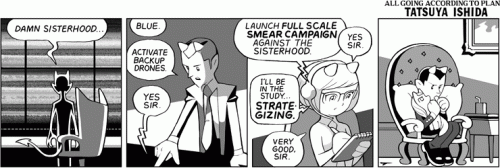Any other fans of the facebook page, “I fucking love science”“? Probably. There’s over 4 million of us, there must be a little overlap.
The author of that website casually ‘revealed’ her identity on twitter recently (in quotes, because she hadn’t hidden it and didn’t consider it a major issue), when a whole bunch of her fans suddenly noticed…hey, she’s a woman!
Elise Andrew, an English blogger living in Canada, posted a link promoting her Twitter feed on her I Fucking Love Science Facebook page, which has more than 4.2m fans.
"I got Twitter! I figured it’s about time I started exploring other social media. If you’re on there, can you Tweet me some science people worth following?" Andrew said.
The post provoked an onslaught of comments discussing her gender and looks. "F.ck me! This is a babe ?!!" wrote commenter Can Durace. "holy hell, youre a HOTTIE!" wrote Douglas Pistone Linares.
Lou Forbes said: "you mean you’re a girl, AND you’re beautiful? wow, i just liked science a lil bit more today ^^"
You know, where I work (in Science!) well more than half the students are women, and with our recent new hire, more than half the biology faculty are women. Heck, a majority of the computer science faculty are women. We picked every single one of them on the basis of brains and talent, and that’s what deserves notability, which is also the case of Elise Andrew.
Why should anyone be surprised when a science enthusiastic turns out to be a woman? Those comments say a lot about the biases of the commenters, that they assume it would be unusual for a scientist to be female, and that somehow their ‘hotness’ should be a factor in the appreciation of science.



